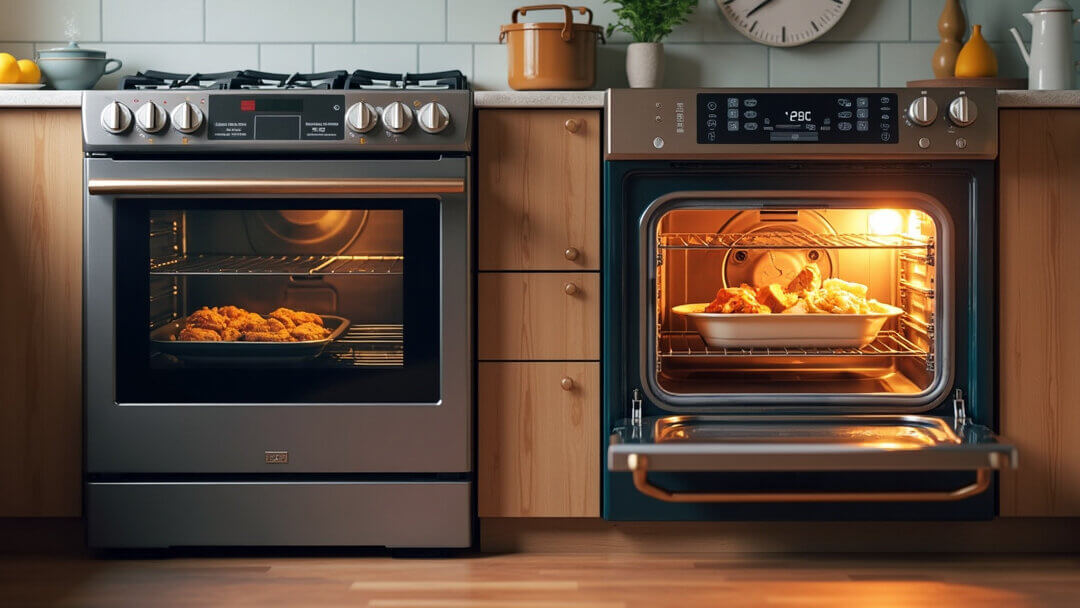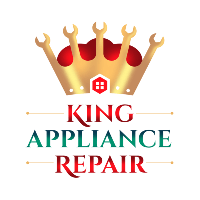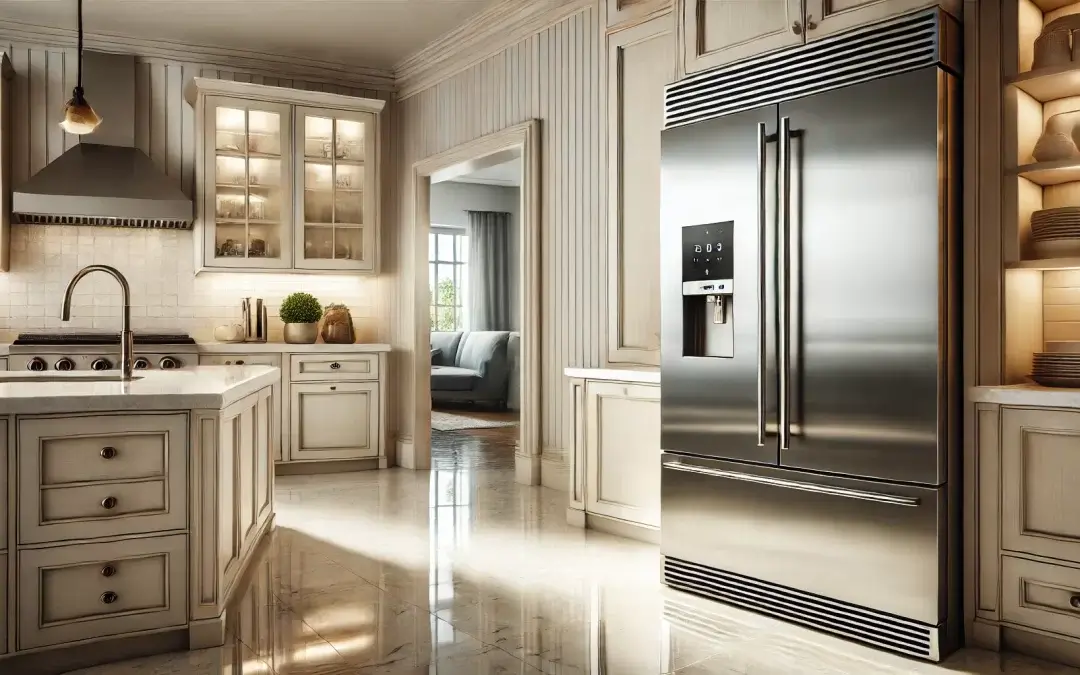
Gas vs Electric Ovens: Best for Cooking & Energy Efficiency
When it comes to choosing the perfect oven for your kitchen, the debate between gas and electric ovens has been ongoing for years. Whether you’re upgrading your current oven or selecting one for your new home, understanding the pros and cons of both types is essential.
In this post, we will break down the key differences between gas and electric ovens, comparing factors such as cooking performance, cost, energy efficiency, safety, and maintenance. By the end of this guide, you’ll have a clearer idea of which oven suits your needs better.
Table of Contents
- Cooking Performance
- Cost Considerations
- Energy Efficiency
- Safety Concerns
- Maintenance and Repairs
- Environmental Impact
- Which Oven is Right for You?
- Conclusion
Cooking Performance
Cooking performance is arguably the most important factor when choosing an oven, as it directly affects how well your food is prepared.
Gas Ovens
Gas ovens use natural gas or propane to produce heat. Here are some advantages and disadvantages of gas ovens in terms of cooking performance:
Advantages:
- Quick Heat-Up Time: Gas ovens tend to heat up faster than electric ovens. This means you spend less time preheating, allowing you to start cooking sooner.
- Moist Heat: Gas ovens produce a more humid heat, which can be beneficial for baking certain types of foods. For example, breads and cakes tend to rise better and remain moist in a gas oven.
- Instantaneous Temperature Changes: Gas ovens offer precise control over temperature changes. If you need to raise or lower the temperature quickly, gas ovens are more responsive.
Disadvantages:
- Inconsistent Heat Distribution: Gas ovens can sometimes suffer from uneven heat distribution. This might require rotating your food to ensure it cooks evenly.
- Hot Spots: Because gas ovens use an open flame, they may have certain areas that are hotter than others, which could lead to uneven cooking.
Electric Ovens
Electric ovens rely on electrical heating elements, usually located at the top and bottom of the oven, to cook food.
Advantages:
- Even Heat Distribution: Electric ovens are known for their even heat distribution, which results in more consistent cooking. This is particularly helpful when baking cakes, cookies, or casseroles.
- Better for Broiling: Electric ovens generally have superior broiling capabilities because the top heating element can provide direct and steady heat.
- Dry Heat: Electric ovens provide drier heat compared to gas ovens, which can be beneficial for roasting or creating crispy textures.
Disadvantages:
- Slower Heat-Up Time: Electric ovens typically take longer to preheat compared to gas ovens. This can be frustrating if you’re in a hurry.
- Slower Temperature Changes: Adjusting the temperature in an electric oven takes longer because the heating elements need time to cool down or heat up after a change in settings.
Cost Considerations
Price is always a significant factor when purchasing a major appliance like an oven. When considering costs, you should factor in both the upfront purchase price and the long-term operating costs.
Upfront Costs
Gas Ovens: Gas ovens are typically more expensive to purchase and install. Installation costs can be higher if you don’t already have a gas line in your home.
Electric Ovens: Electric ovens generally have a lower upfront cost and are easier to install, especially if your home is already set up for electric appliances.
Operating Costs
Gas Ovens: In areas where natural gas is cheaper than electricity, gas ovens can be more cost-effective to operate in the long run.
Electric Ovens: Electric ovens may have higher operating costs, particularly in areas where electricity prices are high. However, the difference in operating costs between gas and electric ovens can vary depending on your location and usage habits.
Energy Efficiency
Energy efficiency is an essential consideration, especially for eco-conscious consumers looking to reduce their carbon footprint and save on utility bills.
Gas Efficiency
- Pros: Gas ovens are often more energy-efficient than electric ovens, as they heat up more quickly and cool down faster, minimizing the amount of energy used.
- Cons: However, the combustion of natural gas or propane releases greenhouse gases into the atmosphere, which can be a concern for those prioritizing environmental sustainability.
Electric Efficiency
- Pros: While electric ovens may use more energy overall, they do not produce direct emissions like gas ovens. If your electricity comes from renewable sources (e.g., wind or solar), electric ovens can be more eco-friendly.
- Cons: Electric ovens take longer to reach the desired temperature, meaning they use more electricity over time, especially in high-energy-use households.
Safety Concerns
Safety is a critical factor when it comes to choosing appliances that involve high heat and potential hazards.
Gas Oven Safety
Pros:
- Gas ovens with modern safety features, such as flame failure devices, are generally safe to use.
Cons:
- There is always a risk of gas leaks, which can lead to dangerous situations, including carbon monoxide poisoning or explosions if not handled properly.
- Open flames pose a risk of burns and fire hazards, especially in households with children or pets.
Electric Oven Safety
Pros:
- Electric ovens are generally safer in terms of fire hazards, as they do not use open flames.
- There is no risk of gas leaks, making electric ovens a more secure choice for many homes.
Cons:
- Electric ovens can still pose a shock hazard if not properly maintained or if there is a malfunction.
Maintenance and Repairs
Proper maintenance and occasional repairs are part of the ownership experience for both gas and electric ovens.
Common Maintenance Issues
- Gas Ovens: Common issues include gas leaks, problems with the ignition system, or uneven heating. Regular inspection of gas lines and components is necessary to ensure safety.
- Electric Ovens: Electric ovens can experience problems with heating elements, control panels, or wiring issues. However, electric ovens are generally considered easier to maintain and repair than gas ovens.
Durability and Lifespan
- Gas Ovens: Gas ovens tend to have a longer lifespan, mainly due to the durability of their mechanical parts.
- Electric Ovens: Electric ovens may not last as long as gas ovens, particularly if the heating elements wear out or fail over time.
Environmental Impact
The environmental impact of your oven depends on both its energy efficiency and the type of fuel it uses.
- Gas Ovens: Gas ovens release carbon dioxide and other greenhouse gases during operation, contributing to climate change. However, they use less energy overall because they heat up and cool down faster than electric ovens.
- Electric Ovens: While electric ovens don’t produce direct emissions, they may be less environmentally friendly if the electricity used to power them comes from fossil fuels. However, if your home is powered by renewable energy, electric ovens can be a greener choice.
Which Oven is Right for You?
Choosing between a gas and electric oven ultimately comes down to your personal preferences, cooking style, and budget. Here’s a quick summary to help you decide:
- Choose a Gas Oven if:
- You prefer faster preheating and instant temperature control.
- You bake or roast foods that benefit from moist heat.
- You live in an area where natural gas is cheaper than electricity.
- Choose an Electric Oven if:
- You value even heat distribution for baking.
- You’re looking for a safer option with no open flames or gas leaks.
- You prioritize eco-friendliness, especially if your home uses renewable energy.
Conclusion
Both gas and electric ovens offer unique advantages, so the best choice depends on your cooking habits, energy preferences, and household needs.
Gas ovens are ideal for those who want faster heating and prefer moist heat for baking, while electric ovens excel at providing even heat distribution and are often more environmentally friendly if powered by renewable energy.
By considering factors like cooking performance, cost, energy efficiency, and safety, you can make an informed decision that will serve you well in the kitchen for years to come.


